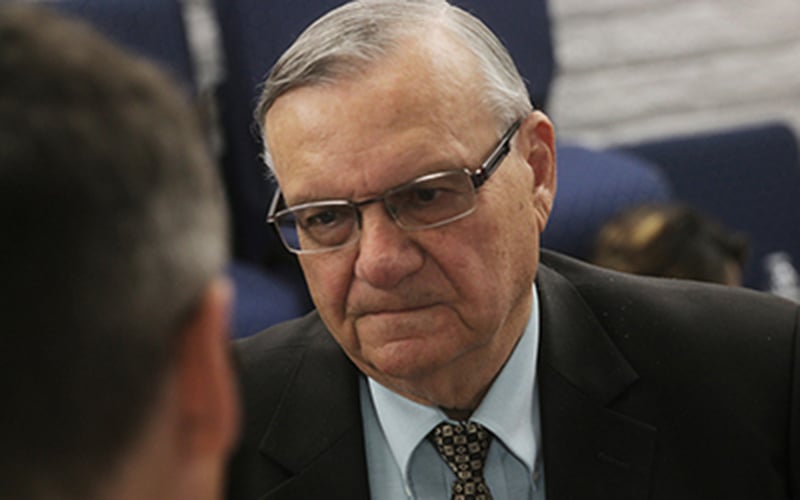WASHINGTON – Former Maricopa County Sheriff Joe Arpaio vowed Monday to continue the fight to clear his name of a criminal contempt of court conviction, after the Supreme Court rejected his challenge of an appeals court ruling.
“The battle continues, I am not surrendering,” Arpaio said Monday after the high court, without comment, refused to intervene in his case, which now returns to the 9th U.S. Circuit Court of Appeals for hearing.
Monday’s ruling is the latest in a twisted saga surrounding Arpaio’s 2017 conviction of criminal contempt of court for his department’s racial profiling of suspects.
The case began in 2013, when U.S. District Judge G. Murray Snow ordered Arpaio and his deputies to stop a policy of detaining people merely because of their race, in an attempt to find undocumented immigrants. But the policy continued, and U.S. District Judge Susan Bolton found Arpaio guilty of criminal contempt in July 2017 for violating Snow’s court order.
“Not only did Defendant (Arpaio) abdicate responsibility, he announced to the world and to his subordinates that he was going to continue business as usual no matter who said otherwise,” Bolton wrote.
President Donald Trump quickly pardoned Arpaio, sparing the former sheriff a possible jail term, and a federal court upheld the pardon. But the court refused to vacate the underlying conviction, leading to an appeal by Arpaio to the 9th Circuit.
It was then that the Justice Department – now under the direction of the Trump administration – said it would not challenge Arpaio’s argument that his conviction should be vacated in light of the pardon.
Faced with having to decide a case where only one side was argued, the circuit court decided in April 2018 to name a special prosecutor to argue against Arpaio’s position. It said then that courts “have inherent authority to appoint a special counsel to represent a position abandoned by the United States on appeal.”
“The long-standing practice of the United States Supreme Court is to use its inherent authority to appoint disinterested counsel to represent the position taken by the United States below when the United States refuses to defend its prior position,” said the order.
Arpaio’s attorney, Jack Wilenchik called that decision “a huge separation of powers issue,” and asked the Supreme Court to step in.
“The issue here is really the whole slippery slope type of thing where the 9th Circuit basically removed, as far as I can tell or as far as anybody can tell, the Department of Justice’s prosecutors in order to hire a prosecutor of their own to represent the United States,” Wilenchik said.
“Courts cannot do that, they cannot control the prosecution,” he said.
Christopher Caldwell, the special prosecutor appointed by the 9th Circuit, did not immediately respond to a request for comment on the Supreme Court’s action. But he argued in filings to the court that Arpaio “fails to address the basic requirements for an extraordinary writ” of mandamus he was seeking.
Mandamus should only be agreed to, Caldwell wrote, if Arpaio showed “(1) he has no other means to attain relief, (2) adequate relief cannot be obtained in another form or another court, and (3) the writ is an appropriate exercise of discretion under the circumstances.” Arpaio did none of those things, Caldwell said.
In its own filing in the case, the Solicitor General’s Office agreed that mandamus was not appropriate – even as it argued that the 9th Circuit’s “decision to appoint a special prosecutor was incorrect.” But as long as Caldwell does not overstep his bounds, it said, the Supreme Court should not get involved.
“Nonetheless, mandamus relief is not warranted at this time because the appointed special prosecutor, who is limited under the appointment order to providing briefing and argument before the court of appeals, serves functionally as an amicus,” or friend of the court, said the brief by Solicitor General Noel Francisco.
Wilenchik said he was not surprised by the high court’s decision, adding that “it’s not the most important issue in the world.”
He said the 9th Circuit’s order “remains a sloppy terrible decision that doesn’t make sense. But unfortunately the Supreme Court just doesn’t have time to correct the 9th Circuit’s mistakes.”
The case now goes back to the appeals court.
“It doesn’t matter, we’ll fight it out at the appellate court,” Arpaio said.
